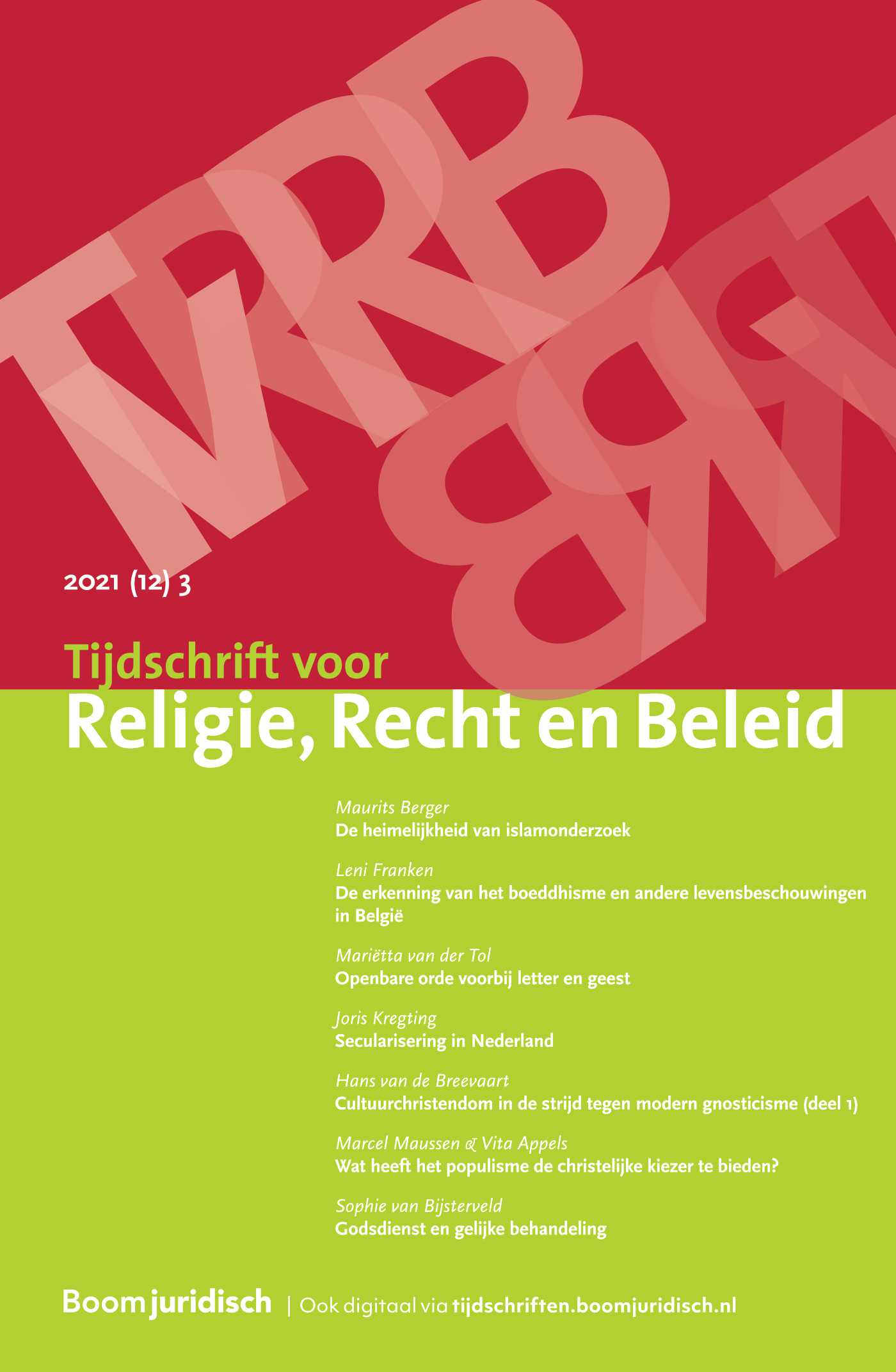|
In this paper I test the thesis that the different fortunes of the secular state in the predominantly Jewish, Christian and Muslim countries depend significantly, although not exclusively, on their different religious background and, in particular, on the conception of God’s law that developed in the theological and legal traditions of these three religions. My analysis will focus primarily on Sunni Islam, Orthodox Judaism and Roman Catholic Christianity. The model of the secular state appears to be connected to the Christian theological concept. It is not neutral and thus, it is futile to attempt to export this model to religious and legal traditions that do not meet the conditions for accepting it. |


Tijdschrift voor Religie, Recht en Beleid
Meer op het gebied van Algemeen
Over dit tijdschriftMeld u zich hier aan voor de attendering op dit tijdschrift zodat u direct een mail ontvangt als er een nieuw digitaal nummer is verschenen en u de artikelen online kunt lezen.
| Diversen |
|
| Auteurs | Ben Koolen |
| Auteursinformatie |
| Artikel |
|
| Auteurs | Silvio Ferrari |
| SamenvattingAuteursinformatie |
| Artikel |
|
| Auteurs | Maurice van Stiphout |
| SamenvattingAuteursinformatie |
|
The introduction of the separation of Church and State had far-reaching consequences for the Roman Catholic Church. Important changes were: the development of an own Ius Publicum Ecclesiasticum, a more central position of the Pope in the Church and a greater uniformity in the Church community than ever before. In the same time in most Western countries Roman Catholics started an emancipatory process both individually and as a group, participating in political life, (re-)establishing religious communities and catholic associations. All these juridical developments really transformed the Church making also new theological reflection possible resulting in the Second Vatican Council. |
|
A historical analysis demonstrates that religious minorities and their protection needs played an important role in the emergence and the first developments of fundamental rights. It is indeed possible to denote a close correlation between the protection needs of religious minorities on the one hand and the fundamental rights enshrined in declarations and treaties on the other. Closer scrutiny reveals that this correlation can actually be explained by evolving views about the special vulnerability of religious minorities in the periods concerned. More recent developments of the human rights paradigm reveal that in the meantime other groups in particular are considered vulnerable and thus in need of special protection. |
| Artikel |
|
| Auteurs | René Guldenmund |
| SamenvattingAuteursinformatie |
|
As a result of reported cases of child abuse by Roman Catholic priests and brothers in The Netherlands, a Dutch solicitor has formally accused the archdiocese of Utrecht and the diocese of Rotterdam of conspiracy. The charges being ill-founded were rejected by the public prosecutor. The present article points out that the charge of conspiracy was ill-considered and legally untenable under Dutch criminal law, because it could not be maintained that the archdiocese of Utrecht or the diocese of Rotterdam were parties to an agreement to commit the offences in question. Unfortunately child abuse and the tendency to keep it silent are a common problem in Dutch society, not only within the Roman Catholic Church, so it should be addressed accordingly. The Dutch Bishops’ Conference and representatives of congregations established in The Netherlands have set up a fact-finding committee under the expert guidance of the elder states-man Mr. Deetman to make an independent investigation into the facts and circumstances of sexual abuse of children within the ecclesiastical province of The Netherlands and to make recommendations for redress and compensation. The committee has submitted its report in December 2011. Like this the Dutch bishops and congregations have set an example how the problem of prescribed cases of child abuse within a complex social organization can be revealed and dealt with. For that purpose criminal law is a less appropriate instrument. It is satisfying to see that other organizations, religious and secular, have taken similar initiatives. |
| Jurisprudentie |
|
| Auteurs | Sophie van Bijsterveld |
| SamenvattingAuteursinformatie |
|
The SGP does not allow women to stand for election for general representative political bodies. This position is based on the biblically inspired conviction that the exercise of such elected functions is against the vocation of women, since men and women have different roles in society. The European Court of Human Rights considers this position unacceptable in the light of Article 3 of Protocol No. 1 (obligation of the states to hold free elections) taken together with Article 14 (right to equal treatment in the enjoyment of Convention rights and freedoms). In a unanimous decision the Court considered the application manifestly ill-founded and, therefore, declared it inadmissible. By doing so, the European Court fails to deal with the real issues at hand and fails to consider the specifics of the case. The mere fact that the highest civil court and the highest administrative court in the Netherlands reached contrary conclusions regarding the human rights dimension of the case already should have led the European Court to deal with case substantively. |

 Aflevering 3
Aflevering 3